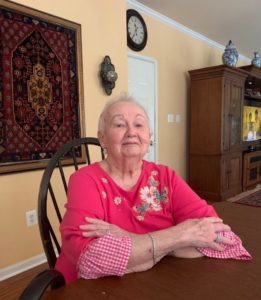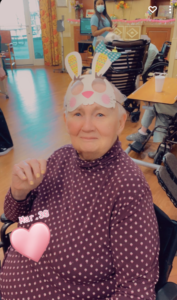![]()
Bertha Paul is feeling pretty good these days. She has her own beautiful bedspread, and her wedding picture is hanging on the wall. Little touches of home mean a lot, though she’s not quite sure why.
Bertha has dementia, and she suffered a fall that left her hospitalized. There, she had a stroke. A few weeks ago, she moved in at St. Elizabeth Rehabilitation and Nursing Center.
“I like it,” Bertha said. “It’s very nice. I like the food.”

Bertha Paul, at home
For 19 years, she’d lived with her daughter, Christine Chehreh, and Christine’s family. Making the decision on a 24-hour residential care center for her mother was painful enough. Moving her in during COVID-19 was gut-wrenching.
“I can’t imagine what other families who have had someone there longer have gone through,” Chehereh said. “I felt like, for those weeks that I couldn’t see Mom, I couldn’t breathe.”
The impact of restricting visits
State and facility restrictions have been particularly rigid for long-term care and skilled nursing facilities. For many months, any positive test anywhere in the center meant no one could come inside to visit. That kind of isolation—seeing only the staff—has an impact on residents.
“They sleep more, they might eat less, they get agitated more easily,” said Nurse Unit Manager Tracy Atwell. “People with dementia don’t always understand why people stopped visiting. They feel abandoned. It’s repetition for those with dementia or Alzheimer’s that helps with familiarity. They may not recognize a loved one when they can come back for a visit.”
When the COVID positivity rate went below 5 percent in Baltimore City, the restrictions on visits eased. At St. Elizabeth’s, there are categorized visit parameters based on whether a resident has been partially vaccinated, fully vaccinated, or not yet vaccinated – often the case for newly arrived residents. Now, a positive case only cancels visits in the unit where the individual is staying. For Bertha and her family, the eased restrictions have been transformational.
“Being able to see her has given my whole family a sense of calm,” said Chehreh, who visits three or four times a week, and often brings her 16-year-old daughter – and things from home, like the bedspread and wedding photo.
Their family has known St. Elizabeth’s for generations. Bertha’s own mother was there many years ago, and Chehreh’s 100-year-old aunt lives there now, on another floor. Since Bertha arrived, Atwell has talked with Chehreh frequently, and often sends photos. But even with that familiarity, Chereh couldn’t feel relieved until she got there in-person and saw her mom.
“I think sometimes on the phone, maybe she knew who I was and maybe not,” Chehreh said. “But I know that she knows who I am when I walk through the door, because she says my name. It means everything.”
The feeling of family
Chehreh also gets to see the interactions between her mother and the staff, especially one named Rose, who has developed a rapport with Bertha. Chehreh’s sister arrived one evening to find Rose feeding Bertha, who had forgotten to finish her meal. Bertha can feed herself, but Rose wanted to make sure she didn’t forget again, and end up hungry or malnourished.
“When I see the interaction and I see how my mother lights up when Rose comes near her or talks to her, it’s really wonderful and comforting,” Chehreh said.
Atwell said fewer visitation restrictions have meant more smiles. Bertha lights up when her children and grandchildren come. According to Atwell, positive energy is a quality-of-life issue, and touch can make a major difference in a resident’s overall well-being.
Bertha is staying active, too. She got to visit with that aunt on another floor not long ago. Last week she helped plant cucumbers and other things – Bertha, understandably, couldn’t quite remember what – and she enjoyed crafting a bunny mask with other residents, just in time for Easter.

Bertha Paul with her Easter crafts project
Chehreh said this transition has had its gifts. Bertha will turn 84 on April 5, Chehreh is sending a big cake to St. Elizabeth’s. Atwell has told her the team will celebrate with Bertha.
“I think she found a different family at St. Elizabeth’s,” Chehreh said. “I walked in there the other day and she was sitting with one of the other women. I’ve never seen her have friendships like that before, because she was always about her family. Now she’s making friends.
“My mother was my whole day every day,” Chehreh continued. “So now I have to express my love for her in a different way. But the best thing for her, really, is an in-person visit. I think sometimes she has memories that last about that.”
